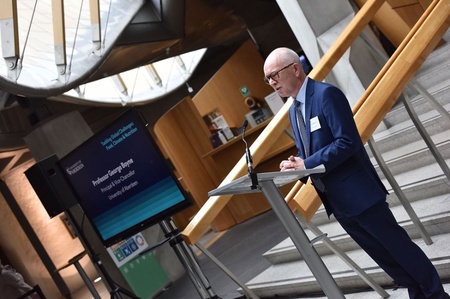The Principal of the University of Aberdeen has urged Scottish politicians to consider the city region as one of the UK Government's planned 'investment zones' north of the border.
There are plans for 12 low-tax investment zones across the UK, with two in Scotland. They are expected to be created around new business clusters, with a focus on sectors such as digital and technology, life sciences and green industries.
Each zone would receive £80m over five years, including tax incentives like business rates relief. While a Westminster initiative, details of the incentives are to be agreed in conjunction with devolved administrations.
Speaking at a reception at Holyrood last night (Wednesday, 17 May), Principal Professor George Boyne said Aberdeen's track record in research, innovation and industry would make it the ideal hub for delivering transformational impact. He also spoke about BioHub, the life sciences partnership initiative which will catalyse collaborative innovation across the academic, commercial and healthcare community.
The call came as the University delivered a networking reception on food and climate change at the Scottish Parliament.
Hosted by Audrey Nicholl MSP, the 80-strong audience of MSPs, civil servants, members of the business community, University staff and other stakeholders heard about the challenges facing the world and some of the ground-breaking research being carried out to support the ambition of delivering a just transition to a sustainable food system.
Professor Jennie Macdiarmid, the interdisciplinary director for health nutrition and wellbeing, spoke about the complexity of the global food system, the association between food and climate change, and the requirement for action across all sectors.
She went on to highlight the University’s impact-focused research which is helping drive change at the intersection of food security, climate and nutrition.
“These challenges form the basis of the areas that require interdisciplinary research and the need to find solutions through innovation and behaviour change to create a food system that is environmentally sustainable, healthy and equitable,” said Professor Macdiarmid.
“They illustrate why an interdisciplinary approach is necessary and shows how food and climate change spans most of the sustainable development goals that our impact-based research seeks to progress.
“The food system, from production to consumption, must change to achieve net zero targets and improve the health of the population. Academics, government and all sectors must continue to work together to understand what is a just transition to a sustainable food system.”
The food system is responsible for a third of overall global greenhouse gas emissions. The University is leading research integrating a number of fields, from sustainable diets in terms of nutrition, the environment and social or economic factors; to agriculture, climate and food security in Africa; and aquaculture, climate and nutrition.
Following Professor Macdiarmid’s presentation, guests heard from Kevin Stewart, MSP for Aberdeen Central and Minister for Transport at the Scottish Government. They were also invited to attend a Research with Impact Showcase in which colleagues from across the University were on hand to talk about their projects.
Professor Boyne said: “The University has a long history of delivering impactful research in the field of health and nutrition, with our work in the areas of health and environmental sustainability leading to Queen’s Anniversary Prizes in 2017 and 2021, achievements we are rightly proud of.
“This is just one strand of our Aberdeen 2040 strategy however. Together with Energy Transition, Social Inclusion and Cultural Diversity, Data and Artificial Intelligence; and Environment and Biodiversity, these five key interdisciplinary research challenges are where we believe the University can continue to make a real impact on the world around us.
“The Aberdeen city region as a whole has a significant role to play as a key player in contributing towards Scotland's National Strategy for Economic Transformation and the wider UK agenda.”


